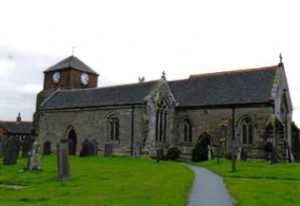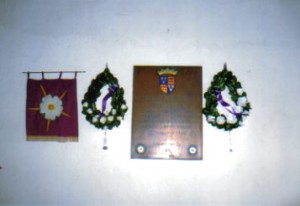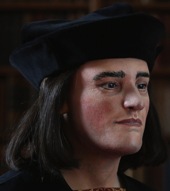The Battle of Bosworth Field

Sutton Cheney Church
August 22, 1485
The day’s tragic events make this date the most significant in the Ricardian calendar. For 32-year-old Richard, former Duke of Gloucester, and now King of England by decree of Parliament, it was the end of a short, tumultuous life.
It was also a complete reversal of all he believed. His long-held motto was Loyaulte Me Lie – loyalty binds me – but on this day he was to discover that those whom he believed he could trust would turn against him and lend their forces to the usurping young man who had invaded the country with an army of French mercenaries.
In 1485 the Wars of the Roses had lasted for 30 years and many nobles had lost their lives through banishment or execution. The number of peers able to command a large number of men now numbered just four: the King, Norfolk, Northumberland – the one-time Lord of the north of England before Richard took charge – and Lord Stanley, whose wife was Margaret Beaufort, the manipulative mother of Henry Tudor.
Yet Richard still had friends whose loyalty bound them to him. They were John Howard, Duke of Norfolk, Sir Robert Brackenbury, William Catesby, Richard Ratcliffe and, Francis Lovell (a childhood friend from their days at Middleham) – the Cat, the Rat and Lovell our Dog of the famous rhyme – and John Kendall, his secretary. Lovell was the only one who escaped from Bosworth, only to disappear after the Battle of Stoke two years later. The others all lost their lives at Bosworth Field or, in Catesby’s case, were executed on Henry Tudor’s command.
The battle itself was hard fought and for a time it appeared the King would win after Richard himself slew Henry’s standard bearer. But then Stanley’s brother, Sir William, brought in his men and Richard’s army was overcome by the force of the extra numbers.
Northumberland appears to have delayed his arrival until the last moment, and decided to hold his men back so they could recover from their long march from York. Whether he had already plotted with Stanley and Tudor has never been proved, but he was one of the first to swear allegiance to Henry after the battle.
There have been queries about Richard’s wisdom in leading his final charge. Many think he felt he had nothing worth living for, having lost his only son and his wife so recently. However his skill and reputation as a leader in battle would never have allowed him to risk the lives of his loyal supporters if he had not thought he had every opportunity to defeat the invader.
His murder marked the end of a two-year reign that was filled with promise, that had already achieved so much. Shakespeare would never realise that the title of his play The Tragedy of King Richard III should in truth refer to the tragedy that befell England because of Richard’s death on August 22, 1485 on the battlefield of Bosworth.
The Richard III Society in the UK commemorates this date every year with a memorial service at Sutton Cheney Church, where wreaths from the Branches and Groups are laid.
 Richard III Memorial Plaque at Sutton Cheney Church with White Rose Banner and wreaths (Australasian Branches’ wreath on the left)
Richard III Memorial Plaque at Sutton Cheney Church with White Rose Banner and wreaths (Australasian Branches’ wreath on the left)
